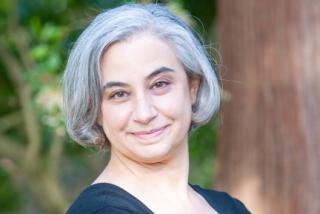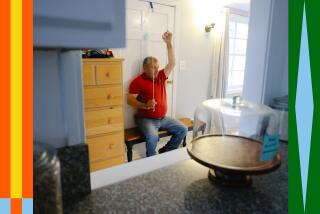Seed of Hope Blossoms a World Away for Psychologist
- Share via
This is a story fresh from the global village. It’s hard to think of it in any other way, not after sitting in Gwen Behrstock’s living room in Newport Beach, with the swimming pool out back and listening to her tell about what happened to her in Katmandu. I mean, I know it’s possible to connect the dots from Orange County to Nepal, but Behrstock’s story kind of brings it all home as to how lives from halfway around the world can intersect.
To be fair to Behrstock, she didn’t bring the story to me. A friend of hers did. But I’m a sucker for a happy ending, so I imposed on her to fill me in.
Behrstock is a 47-year-old psychologist with the Tustin Unified School District and mother of two. She’s married to pediatrician Barry Behrstock, one of several local doctors who over the last 11 years have traveled abroad to volunteer a week or so at local hospitals. Gwen had gone on two previous trips--to Vietnam and Mongolia--but generally limited her involvement to helping the doctors.
It wasn’t lost on her, though, how her husband always said that his Third World volunteer work was some of the most rewarding of his professional life. On this year’s trip to Nepal, Gwen was determined to ply more fully her own trade.
Her inquiries led her to a woman who told Behrstock about her cousin. He was a man with an 8-year-old daughter who was autistic. Though not an expert on autism, Behrstock had seen enough of it in Tustin schools to know how to help. One day in Katmandu, a man named Binjaya Dixit brought his dark-haired daughter to see Gwen in her hotel room.
Until a year earlier, the man said, he and his wife had never heard the word “autism.” In the year since, however, they’d been unable to find any services to help her.
“They were just searching at this point to see how they could help their child,” Behrstock recalled for me this week. “They knew a little bit about autism, but in those countries there’s more of a fatalistic approach. The mortality rate is so high, [their attitude] is kind of like, ‘This is just the way it happens. This is how life is, you take it as it is.’ ”
Behrstock assumed that would be the father’s approach to his daughter’s plight. Instead, she said, “I got a father who was in such love with this child and had given so much to her. As he spoke with me, he started to cry. He said, ‘Please don’t tell my cousin that I’m crying.’ He didn’t want her to know he had this emotion.”
It was obvious to Behrstock that the child was autistic: She gazed about the room, avoided eye contact and was given to aimless strolling. Behrstock felt the girl was operating at about the level of a 1-year-old.
“They really had no means of communication,” Behrstock said of father and daughter. “The only thing she could do was when he said ‘Give me a kiss,’ she would give him a kiss.”
Over the next two to three hours, Behrstock gave Dixit some hints on ways he might increase communication with his daughter, such as using pictures to help her express thoughts. She promised to send him materials when she returned to America and, perhaps most important, to stay in touch.
All of which she did.
Once back in the comfort of Orange County, Behrstock said she thought of Katmandu and those few hours in her hotel room and--possibly because it’s so far away and so different than life here--wondered if the trip wasn’t “a figment of my imagination.”
A couple of letters helped remind her.
“Respected Madame,” one of them began, “I hope this finds you in the best shape of your health and happiness. I offer my sincere gratitude for giving me such valuable information regarding autistic people for the first time in my life. I am using your training and notice some change in my daughter. It is very difficult for me to express my happiness in words. Since my daughter is unable to express her feelings, I have taken this liberty on behalf of my daughter and all the autistic people of Nepal. May all mighty restore continuous happiness and all the best wishes to you and your respected family forever. Sincerely, Binjaya.”
Last week, Behrstock received e-mail from Dixit. He informed her that an Indian mother of an autistic child had recently conducted a three-day workshop in Katmandu. Some local parents of autistic children are forming a support group, he told Behrstock.
“Yesterday we had small meetings among interested parents,” he wrote. “We have decided to start our work by publishing newsletters both in Nepali and English.”
Gwen Behrstock now knows exactly what her husband meant all those years when he talked about the rewards of his Third World work.
“I work with kids all day long and it’s like no big deal,” Behrstock said. “Then, you go over there [Nepal] and give them information they didn’t have before, and it’s such a thrill. They’re so appreciative and thankful and hopeful and optimistic. I enjoy working with kids here, but going someplace where they don’t have it and you can introduce something new, maybe start something, that makes it a little more exciting.”
Dana Parsons’ column appears Wednesday, Friday and Sunday. Readers may reach Parsons by writing to him at the Times Orange County Edition, 1375 Sunflower Ave., Costa Mesa, CA 92626, or calling (714) 966-7821.
More to Read
Sign up for Essential California
The most important California stories and recommendations in your inbox every morning.
You may occasionally receive promotional content from the Los Angeles Times.













